- Home
- Francis Spufford
Unapologetic Page 3
Unapologetic Read online
Page 3
Everybody knows, then, that ‘sin’ basically means ‘indulgence’ or ‘enjoyable naughtiness’. If you were worried, you’d use a different word or phrase. You’d talk about ‘eating disorders’ or ‘addictions’; you’d go to another vocabulary cloud altogether. The result is that when you come across someone trying to use ‘sin’ in its old sense, you may know perfectly well in theory that they must mean something which isn’t principally chocolatey, and yet the modern mood music of the word is so insistent that it’s hard to hear anything except an invocation of a trivially naughty pleasure. And if someone talks, gravely and earnestly, about what a sorrowful burden one of those is, the result will be to make that speaker seem swiftly much, much more alarming than the thing they’re getting worked up about. For which would seem to you to be the bigger problem, the bigger threat to human happiness: a plate of pralines, or a killjoy religious fanatic denouncing them?
If I say the word ‘sin’ to you, I’m basically buggered (as we like to say in the Church of England). It’s going to sound as if I’m bizarrely opposed to pleasure, and because of the continuing link between ‘sin’ and sex, it will seem likely that at the root of my problem with pleasure is a problem with sex. You will diagnose me as a Christian body-hater. You’ll corral me among the enemies of ordinary joy. You’ll class me with the holy life-haters William Blake was thinking of, in the poem in his Songs of Experience in which a chapel appears ‘where I used to play on the green’ –
And tombstones where flowers should be:
And Priests in black gowns were walking their rounds,
And binding with briars my joys and desires.
So I won’t do that. Because that isn’t at all what I mean. What I and most other believers understand by the word I’m not saying to you has got very little to do with yummy transgression. For us, it refers to something much more like the human tendency, the human propensity, to fuck up. Or let’s add one more word: the human propensity to fuck things up, because what we’re talking about here is not just our tendency to lurch and stumble and screw up by accident, our passive role as agents of entropy. It’s our active inclination to break stuff, ‘stuff’ here including moods, promises, relationships we care about, and our own well-being and other people’s, as well as material objects whose high gloss positively seems to invite a big fat scratch. Now, I hope, we’re on common ground. In the end, almost everyone recognises this as one of the truths about themselves. You can get quite a long way through an adult life without having to acknowledge your own personal propensity to (etc. etc.); maybe even all the way through, if you’re someone with a very high threshold of obliviousness, or with the kind of disposition that registers sunshine even when a storm is howling all around. But for most of us the point eventually arrives when, at least for an hour or a day or a season, we find we have to take notice of our HPtFtU (as I think I’d better call it). Our appointment with realisation often comes at one of the classic moments of adult failure: when a marriage ends, when a career stalls or crumbles, when a relationship fades away with a child seen only on Saturdays, when the supposedly recreational coke habit turns out to be exercising veto powers over every other hope and dream. It need not be dramatic, though. It can equally well just be the drifting into place of one more pleasant, indistinguishable little atom of wasted time, one more morning like all the others, which quietly discloses you to yourself. You’re lying in the bath and you notice that you’re thirty-nine and that the way you’re living bears scarcely any resemblance to what you think you’ve always wanted; yet you got here by choice, by a long series of choices for things which, at any one moment, temporarily outbid the things you say you wanted most. And as the water cools, and the light of Saturday morning in summer ripples heartlessly on the bathroom ceiling, you glimpse an unflattering vision of yourself as a being whose wants make no sense, don’t harmonise: whose desires, deep down, are discordantly arranged, so that you truly want to possess and you truly want not to, at the very same time. You’re equipped, you realise, for farce (or even tragedy) more than you are for happy endings. The HPtFtU dawns on you. You have, indeed, fucked things up. Of course you have. You’re human, and that’s where we live; that’s our normal experience.
(Which is the reason, by the way, that I’ve started the tour of religion’s recognisable emotions here, with this undeniably gloomy shit. I could, after all, have put us on the traditional night-time hilltop, and had us gaze out at stars more numerous than the sand grains on a beach, and the red-shifted exhaust of galaxies revving away from us. I could have put our hearts in our mouths and filled us with awe at the bigness of it all; with the luminous, numinous Carl-Sagan-osity of things, which even Richard Dawkins agrees ought to stir us to our depths, though what it should stir us to do, of course, is to seek out a career in the empirical sciences. I will give awe its due later, I promise, but the trouble with it as a starting-point is that it is, by its nature, a rather isolated emotion, marked out by its sudden self-forgetting focus on an object external to us, and by its disconnection from everyday trundling along. If awe is powerful, it tends to be a state we fall out of knackered, after a while, unable to keep up the intensity. If it’s more modest, it tends of its nature to fade away anyway, to peter out on the hilltop where it began. And in neither case is it obvious how awe is supposed to relate to the rest of experience. I think of awe as a kind of National Trust property among feelings: somewhere to visit from time to time, but not a place you can live.)
The HPtFtU is bad news, and like all bad news is not very welcome, especially if you let yourself take seriously the implication that we actually want the destructive things we do, that they are not just an accident that keeps happening to poor little us, but part of our nature; that we are truly cruel as well as truly tender, truly loving and at the same time truly likely to take a quick nasty little pleasure in wasting or breaking love, scorching it knowingly up as the fuel for some hotter or more exciting feeling. We would, on the whole, very much like this not to be true, and our culture conspires to help us avoid and defer and ignore the sting of it as much as possible. The purveyors of flattering images do their damnedest to keep us feeling that we can be as we wish ourselves to be. It would not be very cool or aspirational if we had to imagine our biographies being sculpted out of some awkward substance over which we had limited control. In the ideal land of marketing, you can choose what you are. Each minute is supposed to be the solvent of the one before. All that is solid is supposed to melt into air. If you do get upset about some aspect of your own actions, the advice you get is not to dwell on it; to banish it, in effect, by applying a sense of proportion. Think of all the good stuff that’s also true about you! Well, yes: yet seeing your virtues clearly is difficult for exactly the same reasons that seeing your HPtFtU is, so the advice amounts to a suggestion, really, that you should distract yourself. Keep yourself busy with stuff. Don’t look inside. Shop. Rent a DVD. Kill some zombies on your Xbox. Let the net’s unending flutter of opinions tickle you, and keep you tickled.
When our desires do conflict sharply enough to cause us an unhappiness we can’t distract away, there is a strong contemporary feeling that it ought to be possible to fix the situation by a change in the rules, an alteration of what is and is not permissible. We’ve been telling ourselves a very popular story recently, about a person poisoned by anxiety and self-hatred because they think they are forbidden to do something essential to their nature; then they discover that the prohibition is groundless, that it’s a meaningless taboo left over from less enlightened times which they could and should discard. And so they do the thing they’ve wanted and feared to do – they go to bed with someone of their own gender, they leave the violent husband who belittles them, they explore the polyamorous lifestyle – and it’s OK. The sky doesn’t fall. The ground is still solid under their feet. And they relax into freedom. Think of Stephen Fry in Wilde, when he’s lying next to another man for the first time, saying ‘I feel like a city that’s been under siege
for years, and suddenly the gates are thrown open . . . ’ This is a potent contemporary myth, and like all potent myths, it has a large amount of truth in it. Over the last fifty years, we really have been escaping, as a culture, from a set of cruel and constricting rules, particularly about sexuality and gender roles, which (yes) did have the sanction of religion behind them. (Not that religion caused those rules to exist, on the whole. There was a malignant cultural consensus in place in their favour, of which religion was a part.) But the truth that some problems of conflicted desire can be solved this way, some cases in which we desperately both want and don’t want to do something, doesn’t mean it’s true that all can. Any more than the possibility of abolishing particular rules of behaviour means that we could plausibly abolish all rules of behaviour. There’s always, necessarily, going to be stuff it’s all right to do and stuff it’s emphatically not all right to do. We discover new immoralities to take seriously at the same speed that we abolish old ones. Just as much as our ancestors, but about different things, we’re sure that people are rightly horrified if they find they have certain feelings. Make the thought experiment of turning the man who wants and doesn’t want to want sex with other men into a man who wants and doesn’t want to want sex with children: immediately our feeling vanishes that it’s the existence of a prohibition which is the problem. And no, I’m not saying that those two desires are in any way morally equivalent. I’m saying that soluble problems of conflicted desire represent a lucky subset of a much larger class of insoluble ones, states of tangled wanting we aren’t going to reform away. There can never not be a situation in which people will find it essential to be a certain way, will want and need to be a certain way, and find that they cannot manage it. We are creatures who don’t get to decide what we are, whose natures are always partly hidden from our conscious understanding, who always pull several ways at once. It’s an insight that can be restated in radically different analytical terms, and still have the same implications for experience. You can put it as Freud did, and say that there are unconscious processes which resist and subvert conscious intentions. You can think of it in terms of evolutionary biology, in which case one of the best expressions of it is the geneticist Bill Hamilton’s wonderful description of the human animal as ‘an ambassador sent forth by an unstable coalition’. Or you can quote St Paul: ‘What I would not, that I do. What I would, that I do not.’ Wherever the line is drawn between good and evil, between acceptable and unacceptable, between kind and cruel, between clean and dirty, we’re always going to be voting on both sides of it, despite ourselves. Not all of us, on every subject, all the time, of course; but all of us on some subject or other some of the time.
And this is a state of affairs in the face of which we are, for the most part, currently clueless, toolless, committed to alarmed denial rather than to any more useful or hopeful response. It’s not that we aren’t interested in evil, as a culture. We are, terribly, especially when it manifests itself in sensational and extreme forms. Think of the rise and rise, and rise and rise, and further rise, of the serial-killer romance since Thomas Harris invented it in its modern form with The Silence of the Lambs, and its diversification into torture porn. There are now far more fictional serial killers operating than there have ever been of the very rare kind of real murderer who preys on strangers. But then the function of the serial killer, as a modern mythological figure, is to concentrate an anxiety which is very widely shared, almost universal even – our anxiety about living among strangers, about being alarmingly reliant on the behaviour of the unknowns we move among every day. The serial-killer story finds a way to acknowledge that human behaviour is a continuum, a distribution under a normal curve maybe, with some very odd things at the ends of it, from which we are not insulated except by chance and probability, if we live in a big enough city, in a connected enough network, in a world wide enough to accommodate the spread of what people do. Out there at those ends – we keep being reminded – out there at the tail of human probability, there are terrors, which the serial-killer story renders with don’t-look-away gross-out literalism, as people who want to have at us with surgical instruments or chainsaws or a knife and fork. When it comes to anyone who might want to skin us in a cellar, we’re quite happy to agree that ‘evil’ is the appropriate term. (Which is one reason why the genre is an unexpected redoubt of traditional moral schemes, albeit often treated ironically, or as a cause of horror in themselves. If you want the seven deadly sins taken as something other than food-styling cues, go to David Fincher’s Seven.) The rather severe limitation on the way the serial-killer story does evil, though, is that it always offers it to us as, exactly, something out there, something far distant from us, which by bad luck descends growling and licking its lips on ordinary old, innocent old us, who live in the nice normal middle of the normal curve. It is the predator, we are the prey. It is the doer of the harm. We are the done unto. Which is superficially scary, and then very, very cosy.
But HPtFtU is in here, not out there. The bad news is bad news about us, not just about other people. And when the conviction of it settles in, when we reach one of those stages of our lives where the sorrow of our failure hangs in our chests like a weight, and waking up in the morning is painful because every time the memory of what’s wrong has to ooze back over the lovely blankness of the night – you’ll know what I mean if you’ve ever been there – then, the idea that it would help to cling to a cosy sense of victimhood seems as silly as it would be to try and fight off the flu by waving a toy lightsaber. The bad news, at those moments, feels like the whole truth about you. It isn’t. It is only a truth about you. But the way back to the rediscovery of the rest of what’s true begins with the admission that you really are guilty of the particular bit of HPtFtU whch is making you feel like shit. If you don’t give the weight in your chest its true name you can’t even begin. It’s guilt that drags at your steps, it’s guilt that paints the morning black. In my experience, in times of intense misery it’s letting your guilt be guilt that at least stops you needing to accuse yourself; and in better times, in times of more or less cheerful ordinary muddling through, I’ve found that admitting there’s some black in the colour-chart of my psyche doesn’t invite the blot of dark to swell, or give a partial truth more gloomy power over me than it should have, but the opposite. Admitting there’s some black in the mixture makes it matter less. It makes it easier to pay attention to the mixedness of the rest. It helps you stop wasting your time on denial, and therefore helps you stop ricocheting between unrealistic self-praise and unrealistic self-blame. It helps you be kind to yourself.
‘Guilt’, though, gets a terrible press now: much worse than frothy, frivolous ‘sin’. Our culture does take it seriously, but as a cause of unhappiness in itself, a wanton anxiety-generator. It’s as if the word ‘groundless’ always slid invisibly into place in our sentences next to it. As if it were always a false signal, a fuss being made about nothing by somebody who shouldn’t be beating themselves up over playing tiddly-winks on the Sabbath. Once again, our usage assumes a world where we never do anything it would be appropriate to feel bad about. So the old expressions of guilt stop sounding like functional responses to real situations and become evidence of crazy self-hatred. Strike up the New Orleans big band, please:
Amazing grace, how sweet the sound
That saved a wretch like me . . .
There! Did you hear that? He just called himself a wretch. He’s beating himself up in public. Sorry, mate: lovely tune, loony sentiment. Except that ‘wretch’ is actually a very polite word for what John Newton, the eighteenth-century author of ‘Amazing Grace’, was. John Newton was a slave trader. He made his living transporting cargoes of kidnapped human beings, in conditions of great squalor and suffering, to places where they and their children and their children’s children would be treated all their lives as objects to be bought and sold and brutalised. Some of John Newton’s contemporaries (the ones who weren’t chained below decks in their ow
n shit) may have thought that his profession was only a bit unrespectable; we, on the other hand, recognise that he was participating in one of the world’s great crimes, comparable to the Holocaust. Wretch? John Newton was a horror.
But at least he came to know it. At least he made the journey from comfortable acquiescence in horror to an accurate, and therefore horrified, sense of himself. At least he learned that something was wrong. And ‘Amazing Grace’ is a description of the process by which he began to awaken. The wrinkle is that he wrote it before he gave up slaving. He wrote it under the impression that he had already seen the stuff he should be worrying about – booze and licentiousness, presumably, and playing tiddly-winks on the Sabbath, and not running his slave ship with a swear-box screwed to the mast. In the Holocaust analogy, it’s rather as if a death-camp guard had had a moral crisis, but over cheating his colleagues at poker, and then continued to come to work stoking the ovens, while vowing shakily to be a better person. Yet Newton’s guilt, once found, wouldn’t leave him alone. It went on gradually showing him dark, accurate visions of himself; it went on changing him, until eventually he could not bear the darkness of what he did daily, and gave up the trade, and ended his life as a penitent campaigner against it. At every stage, it had been the same patient guilt that led him on, and so ‘Amazing Grace’, which records its earliest gnawing at him, is unwittingly faithful to the rest of what was coming to him. ‘’Twas grace that taught my heart to fear’, he says in the second verse, and what he’s reporting there is his feeling, his amazed feeling, which we probably wouldn’t want to disagree with under the circumstances, that he’d been done a massive undeserved favour by being allowed to become frightened of himself. The night sweats, the uncontrollable memories, the waking to misery, were all in his case a gift, a lucky bounty he couldn’t ever have earned. (We’ll get to definitions of ‘grace’ later.) There are some human states to which guilty fear is the absolutely appropriate response; on which guilty fear is an immense improvement; from which guilty fear is the first step of the only available rescue. ‘Amazing Grace’ has been popular for two and a half centuries – has been claimed by millions of hearers and singers as true to their own experience – because it has been, so to speak, tested (unwittingly) at the extremes of what human beings ought to feel guilty about. If there’s room for John Newton to make peace with his terrifying variety of HPtFtU, there’s room for everyone.

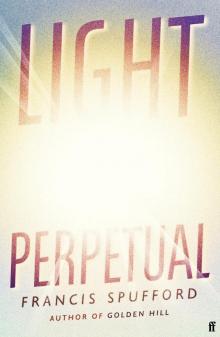 Light Perpetual
Light Perpetual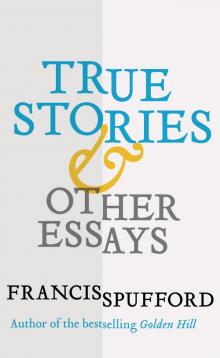 True Stories
True Stories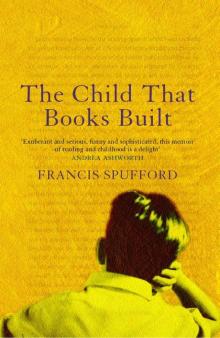 The Child that Books Built
The Child that Books Built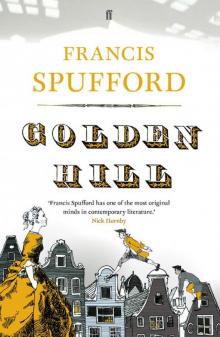 Golden Hill
Golden Hill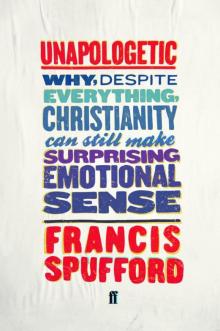 Unapologetic
Unapologetic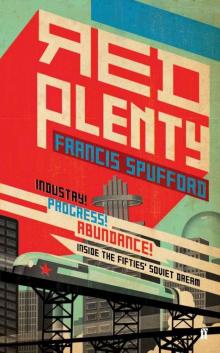 Red Plenty
Red Plenty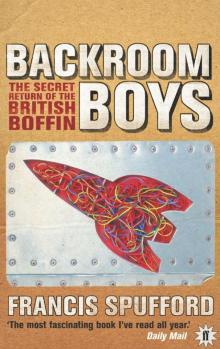 Backroom Boys
Backroom Boys